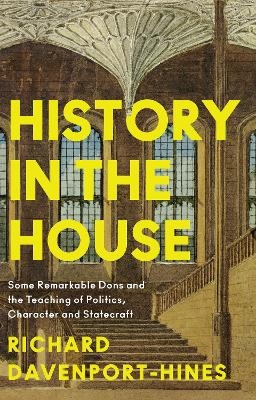
History in the House
Some Remarkable Dons and the Teaching of Politics, Character and Statecraft
Seiten
2024
William Collins (Verlag)
978-0-00-828572-2 (ISBN)
William Collins (Verlag)
978-0-00-828572-2 (ISBN)
Five hundred years ago, Thomas Wolsey endowed in Oxford a foundation he called Cardinal‘s College. Henry VIII, the monarch who dismissed and ruined him, re-established it as Christ Church later in his reign as an institution rich, spacious and imposing beyond any other.
It would help young men of Tudor England and beyond to study history, improve their minds, enlarge imaginations and broaden experience for the benefit of the realm – under the tutelage, of course, of some remarkable dons.
Generations of students had their intellects and world perspectives shaped by Oxford. It was believed that the study of history – touching the ancient world at one end and modern politics at the other – interlaced with geography, economics, political science, law and modern languages, would demonstrate the reasons for the success or failure of states. The student would be taught – in Sir Isaiah Berlin‘s memorable phrase – to ‘spot the bunk!’
In this book, acclaimed historian Richard Davenport- Hines examines the intimate connections between British politics, statecraft and the Oxford University history course. He explores the temperaments, ideas, imagination, prejudices, intentions and influence of a select and self-regulated group of men who taught modern history at Christ Church: Frederick York Powell, Arthur Hassall, Keith Feiling, J. C. Masterman, Roy Harrod, Patrick Gordon Walker, Hugh Trevor-Roper and Robert Blake; by turns an unruly Victorian radical, a staunch legitimist of the Protestant settlement, a Tory, a Whig, a Keynesian, a socialist, a rationalist who enjoyed mischief and a student of realpolitik.
These dons, with their challenging and sometimes contradictory opinions, explored with their pupils the wielding of power, the art of persuasion and the exercise of civil and political responsibility. Intelligent, strenuous and aware of the treachery and uncontrollability of things in the world, they studied the crimes, follies, misfortunes, incapacity, muddle and disloyalty of humankind in every generation. History in the House offers an unforgettable portrait of these men, their enduring influence and the significance of their arguments to public life today.
It would help young men of Tudor England and beyond to study history, improve their minds, enlarge imaginations and broaden experience for the benefit of the realm – under the tutelage, of course, of some remarkable dons.
Generations of students had their intellects and world perspectives shaped by Oxford. It was believed that the study of history – touching the ancient world at one end and modern politics at the other – interlaced with geography, economics, political science, law and modern languages, would demonstrate the reasons for the success or failure of states. The student would be taught – in Sir Isaiah Berlin‘s memorable phrase – to ‘spot the bunk!’
In this book, acclaimed historian Richard Davenport- Hines examines the intimate connections between British politics, statecraft and the Oxford University history course. He explores the temperaments, ideas, imagination, prejudices, intentions and influence of a select and self-regulated group of men who taught modern history at Christ Church: Frederick York Powell, Arthur Hassall, Keith Feiling, J. C. Masterman, Roy Harrod, Patrick Gordon Walker, Hugh Trevor-Roper and Robert Blake; by turns an unruly Victorian radical, a staunch legitimist of the Protestant settlement, a Tory, a Whig, a Keynesian, a socialist, a rationalist who enjoyed mischief and a student of realpolitik.
These dons, with their challenging and sometimes contradictory opinions, explored with their pupils the wielding of power, the art of persuasion and the exercise of civil and political responsibility. Intelligent, strenuous and aware of the treachery and uncontrollability of things in the world, they studied the crimes, follies, misfortunes, incapacity, muddle and disloyalty of humankind in every generation. History in the House offers an unforgettable portrait of these men, their enduring influence and the significance of their arguments to public life today.
Richard Davenport-Hines won the Wolfson Prize for History for his first book, Dudley Docker, and is a fellow of the Royal Historical Society and the Royal Society of Literature. He is the author of several books, including biographies of W.H. Auden and Marcel Proust. His most recent books include An English Affair, Titanic Lives, and Universal Man: The Seven Lives of John Maynard Keynes. He writes for the Guardian, Oldie, Spectator, The Times, Wall Street Journal, and Times Literary Supplement. He is an adviser to the Oxford Dictionary of National Biography and lives in London.
| Erscheinungsdatum | 07.01.2022 |
|---|---|
| Verlagsort | London |
| Sprache | englisch |
| Maße | 159 x 240 mm |
| Gewicht | 680 g |
| Themenwelt | Geschichte ► Allgemeine Geschichte ► Neuzeit (bis 1918) |
| Geschichte ► Allgemeine Geschichte ► Zeitgeschichte | |
| Geisteswissenschaften ► Geschichte ► Regional- / Ländergeschichte | |
| Geschichte ► Teilgebiete der Geschichte ► Kulturgeschichte | |
| Sozialwissenschaften ► Soziologie | |
| ISBN-10 | 0-00-828572-1 / 0008285721 |
| ISBN-13 | 978-0-00-828572-2 / 9780008285722 |
| Zustand | Neuware |
| Haben Sie eine Frage zum Produkt? |
Mehr entdecken
aus dem Bereich
aus dem Bereich
Europa 1848/49 und der Kampf für eine neue Welt
Buch | Hardcover (2023)
DVA (Verlag)
CHF 67,20
Giordano Bruno - ein ketzerisches Leben
Buch | Hardcover (2024)
C.H.Beck (Verlag)
CHF 41,85


